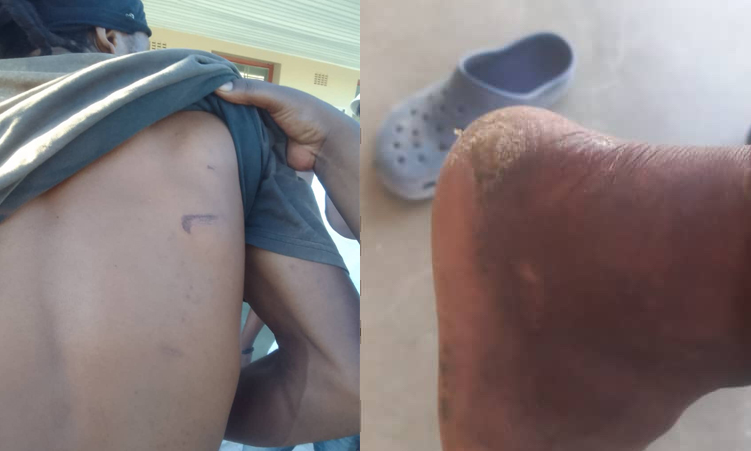AT Opuwo in the Kunene Region small gardens are being used to fight poverty and HIV-AIDS – a disease known to thrive on poverty as it gnaws away at the immune system of infected people who have very meagre diets.
To reverse the trend, a group of US Peace Corps volunteers and locals have initiated small or micro-gardens with the hope to change the face of Opuwo, one micro-garden at a time.Some call them ‘gardens of hope’ and others ‘soil for life’. They all have the same goal: to fight poverty and thus reduce the high number of deaths caused by HIV, the virus that causes AIDS.One such garden is along Opuwo’s main street, which is named after the late paramount chief Mbumbijazo Muharukua, better known as ‘Chief of Kaokoland’.Here hope has sprouted for many people infected and affected by the disease and who are part of a support group.Their tools are a small piece of land (which can be as small as three metres by three metres), old pallets, pieces of black plastic bags, some vegetable seeds, micro- and macronutrients and water.Support group members fashion the pallets into table tops not higher than 1,3 metres, put black plastic over the ‘floor’ to form the bed and punch drainage holes in the plastic to make the portable gardens. They need just enough water to keep the bed moist.Although they use a little riverbed soil or no soil at all and limited water, the micro-gardens can rapidly improve the availability of fresh and nutritious vegetables such as asparagus, parsley, radishes, cabbage, peppers, herbs, fennel, eggplant, unions and lettuce.The micro-gardens provide for an attractive and creative occupation requiring minimal physical effort.’If you are HIV positive, sometimes you don’t have time and energy to spend hours digging in soil and losing water through evaporation,’ explained Peace Corps volunteer Anika Pinkstaff.Pinkstaff is an information and education officer at the Ministry of Health. Her fellow Peace Corps volunteer Obie Pressman in the Ministry of Youth has been pivotal in helping to establish the Opuwo micro-garden, as well as the movement to roll out micro-gardening projects across Namibia.Another Peace Corps volunteer, Edward Wynimko, has initiated a larger garden the size of two football pitches on the outskirts of Opuwo after a local headman donated land and they have already had harvests.Wynimko is attached to the Namibia Red Cross Society regional office in Opuwo. When The Namibian arrived at the micro-garden, two local women, Taimi and Giselline, were busy watering their table-top gardens.Both are members of the support group who were trained in Windhoek and come to the garden each morning to take care of their crops.Apart from the cultivation requiring less physical effort than conventional growing, it is also highly water efficient, which reduces the burden of carrying irrigation water but also helps to conserve water.When life-giving plants sprout the people have the option to eat them and get proper nutrition or sell some for a meagre income to sustain themselves and thus not to worry about hunger.Few can buy the anti-retroviral (ARV) medicines that help to prolong life. Others with free access through the Ministry of Health need proper nutrition to keep taking the strong drugs.’The project will soon be rolled out to the rest of the country. There is currently a workshop in Ondangwa to set up similar micro-gardens there,’ said Pinkstaff.The Opuwo one is strategically located in the main street so that other residents can see it and try similar projects at home.The micro- and macronutrients that garden owners mix with water for the plants are not cheap, but the Ministry of Agriculture and the Kunene Regional Council have already committed themselves to helping people buy some to boost their projects.Although Opuwo is the town with the lowest HIV prevalence rate in the country, the epidemic hits women hardest, eroding communities and exacerbating periodic famine in places where women traditionally work the fields to produce food.The Himba people have largely managed to retain their traditional way of life with their economy revolving around cattle, but their customs and traditions such as polygamy threaten to wipe them out. For many it is normal when older men rich in cattle tend to monopolise the women, taking several wives. The sexual activity also starts early, as girls marry through pre-arranged ceremonies and most fall pregnant very young. In the meantime, the rollout of the micro-gardens will run parallel to many other efforts to fight the impact of HIV and AIDS, as it will change the lives of many without land and income.christof@namibian.com.na
Stay informed with The Namibian – your source for credible journalism. Get in-depth reporting and opinions for
only N$85 a month. Invest in journalism, invest in democracy –
Subscribe Now!










